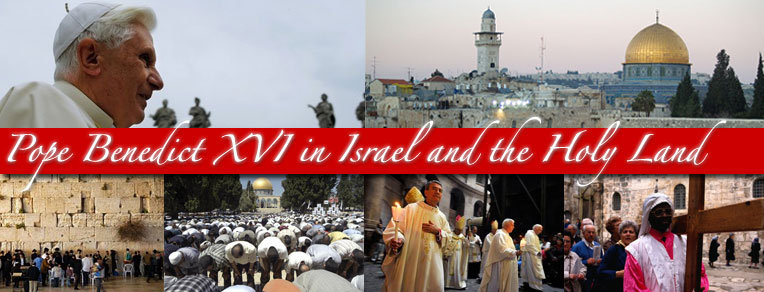Politics, politics, politics. Israel's tourism minister has requested that Pope Benedict XVI to cancel a meeting with the mayor of an Arab-Israeli town (YNet News, April 22, 2009)
Tourism Minister Stas Misezhnikov asked the Vatican to cancel a meeting between Pope Benedict XVI and Sakhnin Mayor Mazen Ghanaim scheduled to take place before the pope's visit to Israel next month, the minister's media advisor Amnon Lieberman reported.
Dr. Ahmad Tibi, Deputy Speaker of the Knesset and leader of the Arab Nationalist Party in Israel, condemned Misezhnikov's condemnation of Stas Misezhnikov:The advisor's statement read that "the planned meeting between the pope and Sakhnin Mayor Mazen Ghanaim is in complete contradiction with the purpose of the pope's visit, that is a state-religious visit meant to promote peace and dialogue between the peoples and religions."
The advisor said the request was sent to the relevant bodies by Israel's ambassador in the Vatican City.
Misezhnikov was quoted in the statement as saying, "This is a terror supporter and warmonger that acts against the national interests of the state in which he serves as mayor, and I call on the Holy See to abstain from meeting with him."
Tibi said this was "incitement from the Yisrael Beiteinu camp against a mayor that was elected democratically."
Of Mayor Mazen Ghanaim and the little town of Sakhnin, we came across this interesting tidbit ("To be an Arab, and an Israeli", by Jerrold Kessel and Pierre Klochendler (# Inter Press Service March 26, 2009):Tibi added that "the Vatican and the international community should isolate the fascist Jewish party's representative".
Sakhnin, a town of 26,000, is somewhat smaller than Um el-Fahm. But it has ample credit as a focus of solidarity with the Palestinian struggle. In October 2000, three Sakhnin youths were shot and killed by Israeli police during demonstrations in support of the Palestinian Intifadah uprising. The town has also long been at the forefront of demands for equality and against the persistent appropriation of their land. The annual Land Day march that recalls lost land is always in Sakhnin.
Sakhnin does not turn its back on these credentials. But, it also sees itself as a model for a new reality that can be created between Jews and Arabs within Israel. What it proffers is a different challenge to the Jewish majority, the challenge of acceptance, cast in the straightforward message of Ghazal abu- Raya: “We want to be part of the State of Israel, a fully integrated part of the nation with equal rights and equal duties, in the centre of the national pitch, not relegated beyond the sidelines, as we always have been.”
The football imagery is no accident. The town entered Jewish Israeli consciousness most dramatically as a result of the success of its club, Bnei Sakhnin (literally “Sons of Sakhnin”). Five years ago, against all odds, the tiny club was crowned State Cup champions. Winning on the football field allowed Sakhnin to pose the challenge whether the cardinal issues of discrimination, equality, identity and co-existence could be squared into the one round ball. ...
Mazen Ghanaim, who as chairman of the football club took his town to glory, was elected last November Sakhnin mayor.
- In other news, a delegation from Jordan to the Vatican, led by Minister of Tourism and Antiquities, Maha Khatib, conveyed their thanks to the Pope for his impending visit (Catholic News Agency April 22, 2009):
At the conclusion of the Wednesday General Audience last week, Khatib said, “In the name of the kings, the government and all of the people, we want to assure you that Jordan is doing everything possible to offer you a dignified and warm welcome.”
“In Jordan Muslims are awaiting the Pope’s visit in the same way as Christians,” said Khatib, who spoke briefly with the Holy Father after the audience.
- Palestinian worshippers from a Bethlehem parish gifted the Holy Father with a kaffiyeh, a traditional Palestinian scarf (Haaretz):
At the end of the service, two youths from the group were brought to the pope and draped the black-and-white checkered scarf on his shoulders. Benedict chatted briefly with them while wearing the scarf, which an aide later removed.
Wednesday, April 22, 2009
Israeli Tourism Minister and Mayor of Sakhnin butt heads over papal visit
Subscribe to:
Post Comments (Atom)




No comments:
Post a Comment